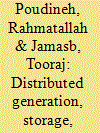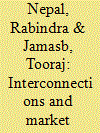|
|
|
Sort Order |
|
|
|
Items / Page
|
|
|
|
|
|
|
| Srl | Item |
| 1 |
ID:
128352


|
|
|
|
|
| Publication |
2014.
|
| Summary/Abstract |
The need for investment in capital intensive electricity networks is on the rise in many countries. A major advantage of distributed resources is their potential for deferring investments in distribution network capacity. However, utilizing the full benefits of these resources requires addressing several technical, economic and regulatory challenges. A significant barrier pertains to the lack of an efficient market mechanism that enables this concept and also is consistent with business model of distribution companies under an unbundled power sector paradigm. This paper proposes a market-oriented approach termed as "contract for deferral scheme" (CDS). The scheme outlines how an economically efficient portfolio of distributed generation, storage, demand response and energy efficiency can be integrated as network resources to reduce the need for grid capacity and defer demand driven network investments.
|
|
|
|
|
|
|
|
|
|
|
|
|
|
|
|
| 2 |
ID:
092555


|
|
|
|
|
| Publication |
2009.
|
| Summary/Abstract |
In recent years, a number of empirical studies and energy regulators have applied benchmarking techniques to measuring the efficiency and performance of network utilities. An important issue has been the extent to which the results are influenced by contextual factors. Among these, weather factors are frequently discussed as being important. We use factor analysis and two-stage data envelopment analysis techniques to examine the effect of a set of important weather factors (gale, hail, temperatures, rainfall and thunder) on the performance of electricity distribution networks in the UK. The results indicate that such factors often do not have a significant economic and statistical effect on the overall performance of the utilities. The weather parameters in some models are significant in terms of economic efficiency. The results echo our previous findings of the importance of extending the basic model to include other inputs such as total expenditure (Totex), customer minutes lost (CML) and network energy losses in regulatory benchmarking.
|
|
|
|
|
|
|
|
|
|
|
|
|
|
|
|
| 3 |
ID:
181430


|
|
|
|
|
| Summary/Abstract |
Energy efficiency can boost economic growth and reduce greenhouse gas (GHG) emissions. However, the global rate of energy efficiency improvement is slowing – a trend that has implications for consumers, businesses and the environment as the adverse climate change and pollution impacts deepen. The emissions in the EU have decreased by 17% in the past decade while member countries such as Germany, United Kingdom and Poland were among the largest emitters of CO2. This paper examines the effect of energy efficiency, proxied by final energy consumption, on CO2 emissions in the EU using a generalized methods of moments based on a quantile regression approach. We use the Panel Quantile ARDL for inference at various quantiles and support the ARDL estimations by the 2SLS estimations for robustness checks. We use the final energy consumption data as an indicator of energy efficiency as included in the energy efficiency indicators database of the International Energy Agency and emissions for the time period spanning 1980–2018. The results indicate that energy efficiency has reduced emissions by 8.6% on average in all the quantiles. Improving efficiency in petroleum consumption will enable the EU to reduce emissions as well as improve energy security by reducing imports as per the aims of the European Green Deal and the Efficiency First Principle. We also recommend that energy efficiency policies should account for possible rebound effects, which can limit their effectiveness.
|
|
|
|
|
|
|
|
|
|
|
|
|
|
|
|
| 4 |
ID:
116958


|
|
|
|
|
| Publication |
2012.
|
| Summary/Abstract |
Interconnections can be an effective way to increase competition and improve market integration in concentrated wholesale electricity markets with limited number of participants. This paper examines the potential for interconnections and increasing market integration in the Irish Single Electricity Market (SEM). We use a time-varying Kalman filter technique to assess the degree of market integration between SEM and other large, mature and interconnected wholesale electricity markets in Europe including Great Britain (GB). The results indicate no market integration between SEM and other European markets except for Elspot and GB. We show that the current state of market integration between SEM and GB is just 17% indicating potential to improve market integration via increased interconnector capacity. The results indicate that liquidity of wholesale markets might be a crucial factor in the market integration process while our results remain inconclusive in determining whether increased trade of renewables can improve market integration.
|
|
|
|
|
|
|
|
|
|
|
|
|
|
|
|
| 5 |
ID:
133186


|
|
|
|
|
| Publication |
2014.
|
| Summary/Abstract |
Price of oil is important for the economies of oil exporting and oil importing countries alike. Therefore, insight into the likely future behaviour and patterns of oil prices can improve economic planning and reduce the impacts of oil market fluctuations. This paper aims to improve the application of Artificial Neural Network (ANN) techniques to prediction of oil price. We develop a dynamic Nonlinear Auto Regressive model with eXogenous input (NARX) as a form of ANN to account for the time factor. We estimate the model using macroeconomic data from OECD countries. In order to compare the results, we develop time series and ANN static models. We then use the output of time series model to develop a NARX model. The NARX model is trained with historical data from 1974 to 2004 and the results are verified with data from 2005 to 2009. The results show that NARX model is more accurate than time series and static ANN models in predicting oil prices in general as well as in predicting the occurrence of oil price shocks.
|
|
|
|
|
|
|
|
|
|
|
|
|
|
|
|
| 6 |
ID:
111077


|
|
|
|
|
| Publication |
2012.
|
| Summary/Abstract |
This paper assesses the issues and options in reforming small electricity sector systems in general while citing Nepal as a specific case. Political instability and increasing electricity demand are two major complicating factors in power sector reform of small systems such as that of Nepal. Lessons from international experience suggest that measures such as cost-reflecting pricing, restructuring and independent regulation are important for the success of reforms. In small systems, the creation of an independent regulatory authority is more important than unbundling of the sector. In the present context of Nepal accounting separation of the main activities may be a pragmatic restructuring approach given the present political and market condition. As the systems gradually grow larger, vertical separation of the system and horizontal splitting of the generation segment and competition in organised wholesale market followed by privatisation remains an option in the long run.
|
|
|
|
|
|
|
|
|
|
|
|
|
|
|
|
| 7 |
ID:
094956


|
|
|
|
|
| Publication |
2010.
|
| Summary/Abstract |
In order to overcome the perverse incentives of excessive maintenance reductions and insufficient network investments arising with incentive regulation of electricity distribution companies, regulators throughout Europe have started regulating service quality. In this paper, we explore the impact of incorporating customers' willingness-to-pay for service quality in benchmarking models on cost efficiency of distribution networks. Therefore, we examine the case of Norway, which features this approach to service quality regulation. We use the data envelopment analysis technique to analyse the effectiveness of such regulatory instruments. Moreover, we discuss the extent to which this indirect regulatory instrument motivates a socially desired service quality level. The results indicate that internalising external or social cost of service quality does not seem to have played an important role in improving cost efficiency in Norwegian distribution utilities.
|
|
|
|
|
|
|
|
|
|
|
|
|
|
|
|
|
|
|
|
|